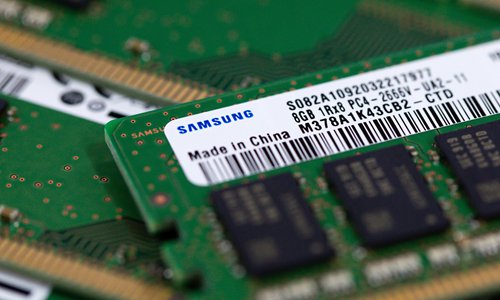Supply-chain pains
Source:Reuters-Global Times Published: 2019/7/10 18:38:40
South Korean chipmakers and their suppliers seek to bypass Tokyo curbs

Samsung Electronics Co 8GB Double Data Rate 4 (DDR4) memory modules seen in Seoul, South Korea, on Tuesday Photo: VCG
South Korean chipmakers and Japanese chemical suppliers caught in the midst of the sudden escalation of a bilateral diplomatic dispute are scrambling to circumvent tightened export controls imposed by Tokyo, industry executives said.
Japan said that it would cease preferential treatment for shipments of the three materials to South Korea, requiring exporters to gain permission each time they want to make a shipment, a process which takes roughly 90 days.
The curbs apply to three materials for which Japan is dominant: photoresists (used to transfer circuit patterns onto semiconductor wafers), hydrogen fluoride (used as an etching gas in the chip-making process) and fluorinated polyimides (used in smartphone displays).
Samsung Electronics Co Ltd and SK Hynix are seeking to buy more materials from countries like China, said Park Jea-gun, head of the Korean Society of Semiconductor & Display Technology.
That includes sounding out companies in countries other than Japan which may have surplus stock of the materials, he added.
Kim Young-woo, an analyst at SK Securities, said the chipmakers have already dispatched sales teams to factories or joint ventures operated by suppliers outside of Japan to secure stock.
Samsung has said it is reviewing a number of measures to minimize impact from the curbs.
Its vice chairman Jay Y. Lee, heir to the parent conglomerate, traveled to Tokyo on July 7, according to a Samsung official, who declined to provide further details on what measures the tech giant was taking.
Though it remains unclear to what extent Tokyo could slow the export approval process or if it will shift towards a ban, South Korean chipmakers are worried the situation could develop into a full-blown crisis.
"These materials, they are not something that we can find at another store and buy quickly," said a source at one South Korean chipmaker, declining to be identified due to the sensitivity of the matter.
"Even if we find alternatives to Japan, we have to conduct tests to make sure the quality is good enough to make chips at a high yield."
Stockpiling is not regarded as a viable option for two of the materials. Hydrogen flouride is highly toxic while photoresists deteriorate quickly.
South Korean chipmakers rely on Japan for most of the materials, although they source some hydrogen flouride from China. They have up to four months of stockpiles for some of the materials, experts say.
Suppliers' efforts
The dispute stems from Tokyo's frustration with what it calls a lack of action by Seoul over a South Korean court ruling last October that ordered Nippon Steel to compensate former forced laborers.
The neighbors share a bitter history dating back to Japan's colonization of the Korean peninsula from 1910 to 1945, which saw use of forced labor by Japanese companies and the use of "comfort women", a euphemism for girls and women forced into sexual slavery. Japan claims the issue of forced labor was fully settled in 1965 when the two countries restored diplomatic ties.
The dispute shows no signs of abating, with Tokyo threatening last week to remove Seoul from a "white list" of countries with minimum trade restrictions that could result in curbs on a broader range of items applicable to weapons production.
Among the Japanese suppliers, JSR Corp believes it could supply some photoresists from its Belgian plant, a company spokesman said.
Tokyo Ohka Kogyo Co Ltd has a plant in South Korea and can supply photoresists to Korean clients "for the time being", a spokesman said. The plant does have to source some materials from Japan to produce photoresists, however, so the export curbs will slow supplies once current inventories are gone.
Stella Chemifa Corp has a joint venture plant in South Korea which can ship hydrogen fluoride to Korean clients, but it declined to comment on how many of its clients' needs the joint venture plant could fulfill.
The company estimates it controls up to 70 percent of the market for high-purity hydrogen fluoride.
Japan produces about 90 percent of fluorinated polyimide, Japanese media have said. It produces around 90 percent of photoresists.
South Korea imported $144 million of the three materials from Japan in the first five months of this year, Korean industry data showed.
The curbs on photoresists only apply to those used in producing chips based on an advanced technique known as extreme ultraviolet or EUV lithography. That could hobble Samsung's efforts to use the technology to catch up with rival Taiwan Semiconductor Manufacturing Co Ltd, analysts say.
South Korea has plans to invest in its domestic industry to develop the materials on its own but there are no easy alternatives to Japanese supplies in the near-term.
"For these tech materials, you need to accumulate know-how in selecting raw materials, how to combine them in an appropriate mix, controlling temperature and so on," Nomura analyst Shigeki Ozaki said.
"Most of the know-how is hidden in a black box."
Posted in: INDUSTRIES,MARKETS,OTHERS,BIZ FOCUS